
Plant-based milks have exploded in popularity but which one truly pours best into your coffee, your smoothie, or your carbon footprint?
In this guide, we’ll break down the pros and cons of four popular non-dairy milks: almond, oat, soy, and coconut. You’ll get the facts on:
Whether you’re a curious newbie, a loyal oat-milk fan, or still holding onto dairy — this is your one-stop guide to making smarter, creamier choices.
👉 What’s your favorite? Vote in the comments!
| Milk Type | Taste | Best Uses | Protein (per 240ml) | Sustainability | Allergen Info |
|---|---|---|---|---|---|
| Almond | Light, nutty | Coffee, cereal, baking | 1g | 💧 Water-intensive crop | Tree nuts |
| Oat | Sweet, creamy | Barista drinks, smoothies | 2g | 🌾 Low-impact, local-friendly | May contain gluten (check label) |
| Soy | Neutral, slightly beany | Cooking, high-protein diets | 7g | 🌱 Sustainable, high-yield | Soy |
| Coconut | Rich, tropical | Curries, desserts, baking | 0g | 🏝️ Low emissions, long transport | Coconut (US: tree nut; EU: not an allergen) |

Taste & Texture
Mildly nutty with a watery base, refreshing, but not always creamy enough for coffee lovers.
Best Uses
Great in smoothies, cold cereal, and light baking. Less ideal for frothing or savory dishes.
Nutrition Highlights
Low in calories (30–50 kcal) but also low in protein. Often fortified with calcium and vitamin D.
Sustainability
Almonds require a lot of water to grow especially in drought-prone California. Low CO₂ but water-heavy.
Great for: light drinkers, smoothie lovers, and cereal crunchers

Taste & Texture
Naturally sweet, thick and creamy. Excellent for coffee and cozy dishes.
Best Uses
Barista-style drinks, sauces, porridge, and even vegan béchamel.
Nutrition Highlights
Around 120 kcal, moderate carbs, ~3g protein. Often enriched with B12, calcium, and D.
Sustainability
Low environmental impact. Oats grow in cooler climates with little irrigation needed.
Great for: coffee fans, creamy sauce makers, and sustainability-conscious sippers

Taste & Texture
Neutral, slightly beany if unsweetened. Very creamy when shaken or frothed.
Best Uses
Cooking, smoothies, protein shakes, and even custards or pancakes.
Nutrition Highlights
80–100 kcal per serving and a solid 7–9g of protein. Naturally rich in isoflavones.
Sustainability
One of the most eco-efficient options. Watch for deforestation concerns, go for organic or EU-grown soy.
Great for: fitness folks, bakers, and high-protein eaters

Taste & Texture
Rich and tropical, but thinner in texture. Adds an unmistakable coconut note.
Best Uses
Curries, desserts, chia puddings, and Thai-inspired dishes.
Nutrition Highlights
Low in protein, high in saturated fat. About 45 kcal per 240 ml (drink version, not the canned variety).
Sustainability
Grows in tropical regions with low water input. But transport emissions and fair labor are concerns.
Great for: bold flavor lovers and Southeast Asian cuisine fans
Plant-based milk has come a long way, from niche health stores to your everyday supermarket shelf. Whether you’re pouring oat milk into your latte, blending coconut milk into a curry, or reaching for soy milk for a protein punch, each option brings its own benefits.
The truth? There’s no one-size-fits-all.
The best plant milk is the one that fits your taste, your values, and your lifestyle.
So taste, compare, explore and make it part of your delicious plant-based journey.
[content-egg module=AmazonNoApi template=grid]